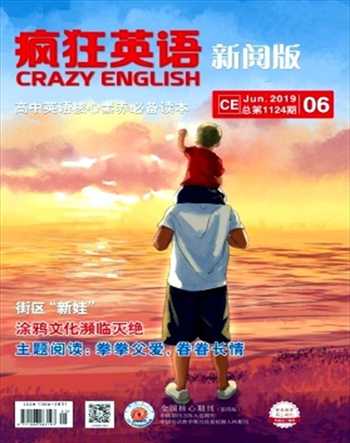New kids on the block 街区“新娃”
A. J. Dalton
在英国,人们用“tweenager”来描述10至12岁的青少年,他们具有鲜明的个性和行为特征,让我们跟着下面这篇文章来了解一下吧。
Have you heard of the term “tweenager”? Its a slang word used in the UK to describe children between about ten and twelve years old. They are between being a junior and a teenager, you see. Why do the press and media refer to kids in this way?
Well, more and more companies now create products and services for tweenagers. The Disney company sold the hugely successful Hannah Montana television show along with its music, film and merchandise to tweenagers and their parents. You could get everything from branded lunchboxes and mobile phone covers, to monthly fan magazines and clothing. But it was probably the High School Musical series of films that started it all: They were firmly intended for a tweenage audience. So, its all about sales, which tells us that tweenagers must have more money and freedom than theyve ever had before. Also, they have more influence upon their parents.
Most children in the UK today get more pocket money than kids did a decade ago. Despite periodic problems in the economy, parents generally have more money to give than previously, since they are having fewer children on average than in the past. In addition, with a higher divorce rate in the UK compared to many other European countries, many parents dont have as much time to spend with their children as they used to, so they try to compensate by buying presents for their children. Its a bad habit for both parents and children to get into, but parents are under constant pressure from commercial marketing and the pleas(懇求) of their children.
You may wonder how tweenagers have more freedom than previous generations. Well, UK children today are very media⁃ and
computer⁃literate. Many have a television in their bedrooms, and with their smartphones, tablets and laptops theyre almost permanently connected to the web!
They have access to much more information about life and the world. They may have experienced a lot in life as well, since a quarter of UK children live in single⁃parent families, so people now say that“kids are getting older younger”.With such sophistication(老练) at such a young age, its no wonder tweenagers are able to influence their parents.
UK tweenagers didnt use to worry so much about spending money on clothes and fashion accessories. Thats changed. Now, they are very fashion⁃conscious and concerned about their image. In a world of television programmes that promise overnight success and fame at a young age (for example, the shows Britains Got Talent and American Idol), some people think its extremely important to look fashionable. Such ideas were also promoted by both the Hannah Montana story, in which a tweenage girl suddenly becomes a world⁃famous pop star, and the High School Musical story, in which tweenagers go through various auditions(试音) for talent shows and musicals.
So what does tweenage fashion look like? Well, its quite horrible really, but then Im a bit too old to appreciate it, I suppose. Its lots of brightly coloured materials, particularly pink, and usually plain, not patterned. There are plenty of bows, necklaces and bracelets, too. Its all very cute, if thats your taste. Take the “Hello Kitty” brand, for example.
Surely none of this is a good thing, is it? Can it really be healthy for us to encourage kids to be like adults at such a young age? Are we stealing childhoods in return for a bit of profit? Well, the UK government is certainly concerned, and for that reason has strict laws preventing companies from explicitly marketing their products and services at children.
Even the rest of UK society is concerned. Now that people are aware of the problem, there is a popular backlash against the exploitation of children by commercial marketing. In addition, many tweenagers outgrow the bright colours and fashions of their tweenage years and go for something darker, such as Gothic clothing. So, is there a happy ending to this story? Well, perhaps there is for the companies. They now understand that, as tweenagers grow up, they often turn to something darker and more rebellious,such as the series of Twilight books and movies which became all the rage some years ago. And there is no doubt that they will be keeping a close eye on what tweenagers and young teens are into next.
Activity 1: Connotations
Look at the following words from the article and try to decide which ones have a positive (Pos), negative (Neg) or neutral (Neu) meaning.
1.constant pressure
2.influence
3.happy ending
4.commercial exploitation
5.tweenager
6.compensate by buying presents
7.popular backlash
Activity 2: Vocabulary
Match the categories with the examples. One of the answers is given.
Categories
1.slang (C)
2.merchandise
3.tweenage fashion
4.commercial exploitation
5.television programme
6.getting older younger
7.being fashion?conscious
8.overnight success
Examples
A.Britains Got Talent
B.sophistication at a young age
C.tweenager (1)
D.suddenly becoming a pop star
E.branded mobile phone covers
F.bright colours and bows
G.spending money on clothes and image
H.marketing aimed at children
Activity 3: Comprehension
Are the following statements true(T) or
false (F) according to the article?
1.Tweenagers often get their parents to buy merchandise for them.
2.When parents get divorced in the UK, the children get presents.
3.Tweenagers today know more about the world than tweenagers in the past.
4.In the UK, companies market their products and services directly at children.
5.When tweenagers get older, they still wear the same style of clothes.
6.The author of the article suggests there wont be a happy ending for anyone.
Fun corner
See if you can find these words from the article.
Example: IMAGE
1.C_TE
2.STR_CT
3._UDIENCE
4.G_TH_C
5.PR_F_T
6._RODUCTS
7._UTGR_W
8.SALE_
Expressions of today
A“fanzine” is a magazine created for fans of a particular celebrity, band or movie.

